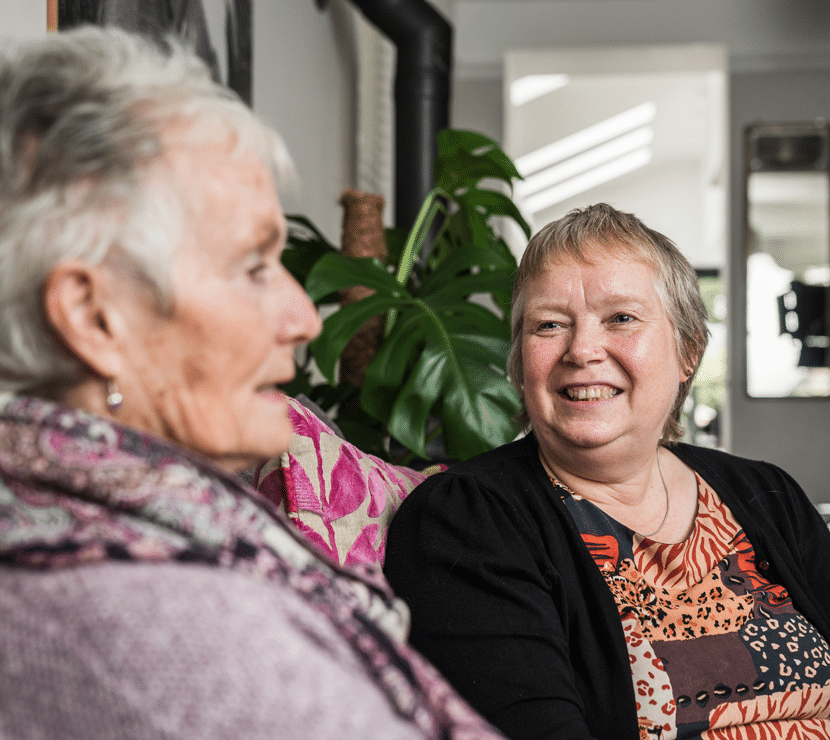Choosing the right care for an elderly loved one is one of the most important decisions you will make. It’s a choice that affects their well-being, comfort, and quality of life. Navigating the myriad of options available may feel overwhelming, but understanding the different types of elderly care agencies and what to look for can make the process smoother and more reassuring.
At Oxford Aunts, we’re committed to helping you find the best possible care provider for your family. These expert tips and insights are designed to guide you every step of the way, ensuring that you make an informed and confident decision that brings peace of mind and enhances your loved one’s daily life.

Types of elderly care agencies
When considering care for an elderly loved one, it’s essential to understand the different types of elderly care agencies available. Each type offers unique services and levels of support, which can significantly impact the quality and consistency of care your loved one receives.
Here, we explore the two main types of elderly care agencies: introductory agencies and fully managed service providers. Understanding the distinctions between introductory agencies and fully managed service providers can help you make an informed decision that best suits your loved one’s needs and your family’s preferences.
Introductory agencies
Introductory agencies serve as intermediaries, connecting families with independent carers. These agencies typically handle the initial recruitment and vetting process, providing a selection of qualified carers for you to choose from. Once the match is made, the agency’s involvement typically ends, and the responsibility for managing the carer shifts to you. This includes scheduling, payment, and supervision.
While introductory agencies can offer more flexibility and potentially lower costs, they require a higher level of involvement and management from the family to ensure the care provided meets their standards.
Fully managed service providers
Fully managed service providers offer a comprehensive approach to elderly care. These agencies not only match qualified carers with families but also manage every aspect of the caregiving process. This includes ongoing supervision, scheduling, payroll, and quality assurance. By handling all administrative tasks, fully managed service providers alleviate the burden on families, ensuring that care is consistent, reliable, and meets professional standards. This option is particularly beneficial for families who prefer a hands-off approach and peace of mind knowing their loved one receives continuous, expertly managed care.
The importance of the Care Quality Commission
The Care Quality Commission (CQC) plays a pivotal role in maintaining high standards within the home care industry. As the independent regulator of health and social care services in England, the CQC ensures that home care agencies meet essential quality and safety standards.
The CQC conducts regular inspections of home care agencies to evaluate their performance in key areas such as care quality, safety, and responsiveness. These inspections result in detailed reports that provide valuable insights into an agency’s strengths and areas for improvement. By reviewing these reports, you can clearly understand how well an agency performs and whether it meets the necessary standards to provide safe and effective care.
Choosing a CQC-registered and well-rated home care agency gives you confidence that your loved one will receive high-quality, regulated care. The CQC’s oversight helps ensure that agencies are held accountable and continuously strive to improve their services, ultimately promoting better outcomes for individuals receiving care at home.
You can find and compare home care services on the CQC website.

Choosing an elderly care agency: Steps to take
Choosing the right home care agency for your loved one is a crucial decision that requires thorough research and consideration. Here is some guidance on how to effectively evaluate home care agencies to ensure you find the perfect fit for your family:
1. Determine care needs
Understanding and clearly defining your loved one’s care needs is the first crucial step in evaluating potential home care providers. By identifying specific requirements, you can tailor your search and ask the right questions to ensure the best possible care.
Assessing Medical and Personal Care Requirements
Consider whether your loved one requires specialised medical care, such as wound care, medication management, or assistance with medical equipment. Make a list of these medical needs to discuss with potential providers.
You’ll also want to identify any daily personal care needs, including bathing, dressing, grooming, and mobility assistance. Understanding these requirements will help you find a carer who is capable and comfortable with providing this level of support.
Considering Lifestyle and Emotional Support
Determine the level of assistance your loved one will need with routine activities, such as meal preparation, housekeeping, transportation, and shopping. This ensures a comprehensive care plan that supports your loved one’s daily life, so that they can continue living as they always have.
Do not forget the importance of companionship and emotional support. A carer who can engage in meaningful activities, provide companionship, and support social interactions can greatly enhance your loved one’s quality of life. Consider your loved one’s social needs and whether they could benefit from the companionship of a consistent carer.
Special Considerations for Complex Medical Conditions
If your loved one has a complex medical condition , such as dementia, Parkinson’s disease, or diabetes, ensure that potential carers have the necessary training and experience to manage these conditions effectively. They should be adept in medication management, symptom recognition, and behavioural support tailored to your loved one’s specific needs.
Effective communication and collaboration with healthcare professionals are vital, alongside continuous monitoring and evaluation of your loved one’s condition. Prioritising these factors enables you to select carers who not only possess medical expertise but also offer compassionate and comprehensive care.
Evaluate care agencies
Start by reaching out to prospective home care agencies. A simple phone call can provide valuable insights into their responsiveness and communication practices. Pay attention to how easy it is to reach them and how they handle your inquiries.
Before meeting with a potential home care provider, prepare a list of questions to guide your conversation. Encourage your loved one to participate and ask their own questions as well. Tailor your questions to your specific needs and concerns, ensuring you gather all the necessary information to make an informed decision. For instance, if your loved one has a complex medical condition, ask if the agency can provide specialised care.
During your meeting with the home care agency, don’t hesitate to ask important questions to gain a deeper understanding of their services and policies. Consider asking questions such as:
- How many employees does your agency have?
- What is the agency’s experience in the industry, and how many years have you been in business?
- Can you share an example of a challenging situation your agency has faced, and how did you resolve it?
- How does the agency handle providing replacement caregivers if our regular carer is unavailable?
- What support can I expect from your agency if I need to contact someone after hours?
Use this opportunity to get to know the home care agency on a deeper level. Don’t shy away from asking challenging questions or expressing your concerns. Transparency is key to building trust, and a reputable agency will welcome your inquiries with open arms.
By following these steps and thoroughly evaluating home care agencies, you can confidently choose the right partner to provide compassionate, personalised care for your loved one.
3. Review your options
After meeting with potential home care agencies, take some time to reflect on your experiences. Discuss the options with your loved one, allowing them to share their likes and dislikes. Consider the responsiveness of each agency—did they answer your call promptly, or did you have to leave a message? Evaluate the genuineness and thoughtfulness of the staff. Were they attentive and considerate, genuinely listening to your concerns and offering practical solutions?
Trust your instincts. If something felt off during your interactions, it might indicate that the agency is not the right fit for your family. Be cautious of agencies that promise perfection, as this may be unrealistic and suggest underlying issues. Unless your loved one’s care needs are urgent, take your time to make a well-informed decision that ensures their comfort and well-being.

Understanding the costs
One of the first questions most families ask when contacting a home care provider is, “How much do you charge?” Determining the cost of home care services involves a thorough exchange of information during the initial consultation to understand unique needs and preferences. Since home care services are tailored to each client, an accurate quote depends on these specifics.
Request cost information or an individual quote
Home care companies should offer a general range of hourly rates and initiate a conversation to learn more about the care recipient’s unique needs. Both the company and the consumer aim to avoid any surprises regarding rates. During initial consultations, it’s essential to discuss general payment and billing policies.
Inquire about hourly rates and how they may vary based on the services needed, carer qualifications, and training. Additionally, ask about rates for overnight, weekend, and holiday care. It’s also important to understand the billing frequency and whether the company accepts credit cards or requires a deposit for services. Determine if the agency accepts long-term care insurance and whether they bill the insurance company directly or require upfront payment with subsequent reimbursement.
Ask about time minimums
Increased levels of care often require varying amounts of service, typically measured in hours. Many home care companies have a minimum hourly requirement for home visits, usually between two and four hours. Even if a client needs just an hour of care, they may still be subject to paying the minimum hourly requirement.
To establish a realistic care schedule and understand the associated costs, address the following points:
- Work with the provider to evaluate the number of hours of care needed.
- Inquire about hourly minimums per visit.
- Determine the process for adjusting care hours as needs change.
- Find out if changing the number of care hours will necessitate a change in the carers(s) assigned to your loved one.
- By thoroughly discussing these aspects, you can ensure that the care plan is both appropriate and cost-effective for your family’s needs.
The live-in care specialists
We have provided care services throughout Oxfordshire and surrounding counties for over 50 years. Located in the heart of Oxford, our reputation is built on high standards of live-in care, local expertise and an approach to care delivery that is trusted by families throughout our community and beyond.
Talk to us about your live-in care needs
Call our friendly and approachable team today to see how we can help you and your family.





